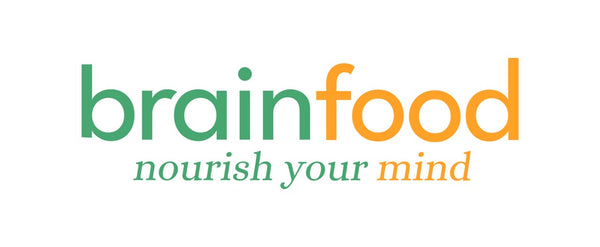
Under Pressure: Feed Your Brain & Reduce the Stress
Share
How do you typically spend your weekdays?
To put food on the table while also keeping up with life’s quick pace, many of us have become increasingly unhealthy, with poor dietary habits, sedentary lifestyles, and high stress levels taking a toll on our bodies both physically and mentally.
Not to mention, it’s often hard to escape outside of the home, as well. Just think about the breakfast staples included at a common hotel buffet. Bagels, doughnuts, sugary cereals, and other on-the-go items are likely found at each station, and the sole banana in the side table’s fruit bowl remains untouched.
The foods we eat directly impact our physical and mental health, influencing everything from energy levels and mood to increased tendencies for anxiety and depression (Spencer, Korosi, Layé, et al., 2017). While many people focus on nutrition for physical health benefits, few realize the critical role it plays in brain health. Cue the term “mind-body connection.”
This has been a popular buzzword within the health and wellness space for years now. There’s no doubt some recent trends have contributed: The surge in the use of digital fitness technology, “wellness” social media reels, and educational podcasts on the topic have largely contributed to the hype. So, how exactly does the mind-body connection work? Let’s break things down a bit.
The Mind-Body Definition
The mind-body connection is the idea that our thoughts, emotions, beliefs, and attitudes can positively or negatively affect our biological functioning, and, conversely, our physical health can impact our mental state. When we are lacking in any physical area, we aren’t able to regulate our hormones, nervous system, and emotions, leaving us more vulnerable to daily stressors. Nutrients help regulate these hormones as well as neutralize harmful molecules produced when your body is under stress.
So, when you aren’t consuming enough healthy nutrients, there’s more to it than creeping numbers on the scale–Your brain suffers, too. Sure, maintaining a healthy weight is important, but what else is happening to the body and how does it work in tandem with the mind? One article from Willow Counseling unpacks the relationship between nutrition and mental health, claiming that you are more at risk for preventable diseases and also more likely to feel sluggish and depressed when not eating the proper nutrients (2024).

This diagram illustrates the connection between the gut and the brain, known as the gut-brain axis, and its influence on mental health. It shows how the gut microbiome—through its production of neurotransmitters, vitamins, and fatty acids—affects brain function and mood. Stress can activate the hypothalamic-pituitary-adrenal (HPA) axis, leading to cortisol release and influencing immune cells.
But why does an unhealthy gut make you feel stressed? They don’t call it the nervous system for nothing, and it’s a big part of the mind-body connection.
There are two parts of the autonomic nervous system: the sympathetic nervous system and the parasympathetic nervous system. In an analogy made by Harvard, the sympathetic system works like a gas pedal on a car to speed up the cortisol spike, and this is known as the fight-or-flight response.

On High Alert: Recognizing Cortisol Spikes in Daily Life
The mind-body connection affects many different aspects of our behavior, thoughts, and emotions (too many to dive into in one session). So let’s start with one that may be top of mind on a busy day - stress. Since getting stressed out from time to time is inevitable, it’s important to train your brain to notice triggers and, as a response, work to regulate your emotions to prevent a cortisol spike. Marilyn Walls, M.S., details a common cycle of stress in peoples’ lives:
“Stress creates a loop in the brain, a circle arising from poor sleep, poor nutrition or emotional distress. This leads to the brain’s decreased ability to concentrate. The circle continues with worry, as focus and learning take a hit. Our cortisol rises, and the hippocampus loses neurons and volume. Meanwhile the amygdala has the whole body on high alert, and the nucleus accumbens, the brains’s [sic] addict, is looking for comfort in sugar, coffee or some other favored drug.”
Comfort foods appease the cortisol crisis. In excess, added sugars, caffeine, and simple carbs can wreak havoc on the nervous system, so it’s best to avoid these when stress levels are already high. High stress levels are directly linked to the neural circuitry involving the nucleus accumbens, the amygdala, and the hippocampus. In order to unpack this, we’ll need to take a closer look at the body’s limbic system.
Wanna Know: How it Works
The Limbic System and Mental Health
According to the National Institutes of Health (NIH), the nucleus accumbens (NAc) is the brain’s center of reward and learning. The study details that stress can actually alter its functioning and “induce dramatic neurochemical alterations in the NAc, leading to depressive phenotypes” (Shirayama & Chaki, 2006). The neurons in the NAc shell also receive input from the prefrontal cortex, amygdala, and hippocampus. All three of these are part of the limbic system.

To better understand some limbic system associations, Harvard gives another good example:
“When someone confronts an oncoming car or other danger, the eyes or ears (or both) send the information to the amygdala, an area of the brain that contributes to emotional processing. The amygdala interprets the images and sounds. When it perceives danger, it instantly sends a distress signal to the hypothalamus” (Harvard Health Publishing, 2024).
The amygdala is also a critical component of stress that affects hippocampal functioning (Kim, Pellman, & Kim, 2015). According to an article from Springer Nature, “Growing evidence indicates that anxiety is associated with increased neuronal excitability in the hippocampus, and alterations in local regulation of hippocampal excitability have been suggested to underlie behavioral disruptions characteristic of certain anxiety disorders” (2021). So how can we keep our cognitive functioning in check? It’s all about balance.
Using the Mind-Body Connection Wisely: Break That Stress Loop
Now that you’re familiar with some of the brain’s key players, let’s return to that mind-body relationship. Imagine you have a big presentation coming up at work and you’re stressed. You have no time to cook dinner, so you order a less than nutritious takeout. You stay up late rehearsing and preparing, remaining caffeinated as you plug along. Then, you get only a few hours of sleep before that alarm clock blares. Cue Marilyn Walls’ stress loop. Since we now know that this loop is tied to the limbic system, and the limbic system’s peak function can be tied to proper sleep and diet, then reducing stress is actually within our power!
Here are three helpful tips for breaking the loop:
- Nourish Your Body: A balanced diet supports the brain's ability to handle stress. Studies have shown that foods rich in antioxidants, omega-3 fatty acids, and vitamins can reduce the brain's inflammatory response to stress. In contrast, a diet high in glucose can elevate cortisol and anxiety levels (McEwen, 2007).
- Prioritize Sleep: Sleep deprivation has been linked to an increase in stress levels. According to a study published in Psychoneuroendocrinology, poor sleep quality leads to heightened cortisol levels, making it harder for the body to recover from stress (Chtourou & Souissi, 2012). Ensuring adequate, restful sleep helps regulate stress and supports cognitive function.
- Practice Mindfulness Meditation: Research has shown that mindfulness and meditation can help reduce stress by decreasing the activity of the amygdala, the brain's "fear center." Studies also suggest that mindfulness practices improve emotional regulation and reduce cortisol, the stress hormone (Zeidan et al., 2010).
